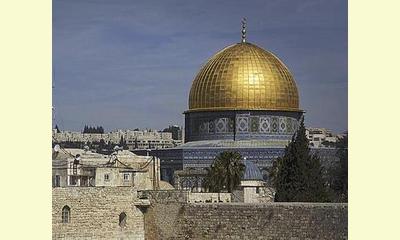|
|
Holy Land tours a new tool in peacebuilding
un article par Aziz Abu Sarah and Talia Salem, Common Ground News Service (excerpts)
In Jerusalem, Shira Nesher, an Israeli, stands alongside Fakhira Halloun, a Palestinian, as Nesher tells her story about life in a conflict zone to a group of American university students who are hanging onto her every word. “My family members are Holocaust survivors, and as an Israeli I grew up in an environment of fear and conflict. When I was 18, I enlisted in the Israeli Defense Forces, where I eventually became a military tour guide and an educator…”

click on photo to enlarge
When she is finished, Fakhira follows with her own story. “I am a Palestinian Christian with Israeli citizenship. I grew up in a Druze village, as a minority among minorities, with stories of the nakba, the Palestinian catastrophe, in a place where identity limits access and mobility. Now, I devote my life to finding freedom in my native land.”
These two speakers are tour guides with the Middle East Justice and Development Initiative (MEJDI); they are leading a dual-narrative tour for a student group. It is rare to see Israelis and Palestinians telling competing narratives, yet working together. Though they live side-by-side, Israelis seldom meet Palestinians, and vice-versa.
MEJDI is the brainchild of two Jewish Americans – one of whom is an Orthodox rabbi – and one Palestinian who work together at the Center for World Religions, Diplomacy and Conflict Resolution at George Mason University in Arlington, Virginia. They believe that peacebuilding activities must use sustainable business models . . .
The emotional and physical journey participants take through the narratives of the Holy Land introduces them to many stakeholders on both sides of the conflict. The groups meet with a rabbi who explains the significance of the Western Wall in Judaism. The exploration continues with meeting an imam at the Al-Asqa Mosque. On a different day, they visit Ramallah and meet with a high-ranking Palestinian official; they later connect with an Israeli politician in Jerusalem . . .
The experience of exploring different sides of this thorny conflict is not typical of most tours to the Holy Land. Every year over three million tourists visit Israel and Palestine. Many of the tourists come to see the Holy Land and the holy sites without taking time to meet the people who live there. Their tour guide typically wields an enormous influence on the way they understand the culture, politics and roots of the conflict.
By contrast, the MEJDI guides rely on their personal stories about the conflict, while connecting them back to the larger story of their people. It is not about rehashing the gritty historical details that led up to the present situation, but rather about creating greater understanding. Participants are given time to reflect on the information they learn and interact with the guides and speakers to reconcile their feelings with what they heard.
MEJDI also operates in Egypt, Turkey and Jordan, and will soon expand to new countries, using the same principle of helping participants experience places through differing narratives . . .
|








|
DISCUSSION
Question(s) liée(s) à cet article:
Jewish-Palestinian dialogue, How is dialogue different from conversation, discussion, or debate?
* * * * *
Commentaire le plus récent:
Len and Libby Traubman have sent in the following important addition to their year-end review of the public peace process for Palestiinian-Jewish dialogue.
NEW INITIATIVE OF PROMINENT AMERICAN RELIGIOUS LEADERS FOR MIDDLE EAST PEACE
In December, 2003, a delegation of 33 of America's most prominent Jewish, Christian and Muslim religious leaders met in Washington, DC to announce their new, unprecedented, collaborative effort -- The National Interreligious Leadership Initiative for Peace in the Middle East.
These citizen-leaders of their faiths, and their plans, are described at:
http://www.walktheroadtopeace.org
They will continue working within their communities and together "to mobilize broad public support for active, determined and effective U.S. leadership in pursuit of peace between Israel, the Palestinians and Arab states."
They insist on a viable, independent, democratic Palestinian state alongside the existing state of Israel with enduring peace and security for both sides, thus amplifying the voices of increasing numbers of courageous Arabs and Jews of goodwill.
The Washington convergence was initiated by A Different Future (http://www.adifferentfuture.org), the U.S. Interreligious Committee for Peace in the Middle East
(http://www.usicpme.org), and the United Religions Initiative (http://www.uri.org) with initial financial support from the Nathan Cummings Foundation.

|
|









